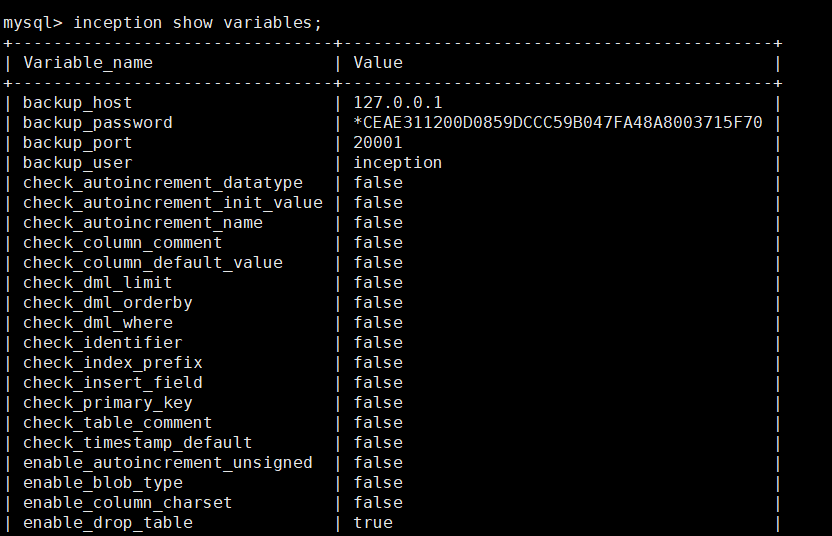# Demo
# python Demo
pip install pymysql prettytable
#!/usr/bin/env python
# -*- coding:utf-8 -*-
import pymysql
import prettytable as pt
tb = pt.PrettyTable()
sql = '''/*--user=root;--password=root;--host=127.0.0.1;--check=1;--port=3306;*/
inception_magic_start;
use test_inc;
create table t1(id int primary key,c1 int);
insert into t1(id,c1,c2) values(1,1,1);
inception_magic_commit;'''
conn = pymysql.connect(host='127.0.0.1', user='', passwd='',
db='', port=4000, charset="utf8mb4")
cur = conn.cursor()
ret = cur.execute(sql)
result = cur.fetchall()
cur.close()
conn.close()
tb.field_names = [i[0] for i in cur.description]
for row in result:
tb.add_row(row)
print(tb)
Results show:
| order_id | stage | error_level | stage_status | error_message | sql | affected_rows | sequence | backup_dbname | execute_time | sqlsha1 | backup_time |
|---|---|---|---|---|---|---|---|---|---|---|---|
| 1 | CHECKED | 0 | Audit Completed | None | use test_inc | 0 | 0_0_00000000 | None | 0 | None | 0 |
| 2 | CHECKED | 0 | Audit Completed | None | create table t1(id int primary key,c1 int) | 0 | 0_0_00000001 | None | 0 | None | 0 |
| 3 | CHECKED | 2 | Audit Completed | Column 't1.c2' not existed. | insert into t1(id,c1,c2) values(1,1,1) | 1 | 0_0_00000002 | None | 0 | None | 0 |
# golang Demo
GO111MODULE=on go run test.go
test.go:
package main
import (
"database/sql"
"fmt"
_ "github.com/go-sql-driver/mysql"
"github.com/syohex/go-texttable"
"log"
)
func main() {
db, err := sql.Open("mysql", "root:@tcp(127.0.0.1:4000)/")
defer db.Close()
sql := `/*--user=test;--password=test;--host=127.0.0.1;--port=3306;--check=1;*/
inception_magic_start;
use test;
create table t1(id int primary key);
alter table t1 add index idx_id (id);
create table t2(jid int primary key);
inception_magic_commit;`
rows, err := db.Query(sql)
if err != nil {
log.Fatal(err)
}
defer rows.Close()
cols, err := rows.Columns()
if err != nil {
log.Fatalln(err)
}
fmt.Println(cols)
tbl := &texttable.TextTable{}
tbl.SetHeader(cols[0], cols[1], cols[2], cols[3], cols[4], cols[5], cols[6], cols[7], cols[8], cols[9], cols[10], cols[11])
for rows.Next() {
var order_id, affected_rows, stage, error_level, stage_status, error_message, sql, sequence, backup_dbname, execute_time, sqlsha1, backup_time []uint8
err = rows.Scan(&order_id, &stage, &error_level, &stage_status, &error_message, &sql, &affected_rows, &sequence, &backup_dbname, &execute_time, &sqlsha1, &backup_time)
tbl.AddRow(string(order_id), string(affected_rows), string(stage), string(error_level), string(stage_status), string(error_message), string(sql), string(sequence), string(backup_dbname), string(execute_time))
// tbl.AddRow(string(nil_process(sqlsha1)))
}
fmt.Println(tbl.Draw())
}
# Result set description
Please refer to Result set
# system variables
connection
mysql -h127.0.0.1 -P4000
inception show variables;

# processlist
connections
mysql -h127.0.0.1 -P4000
inception show processlist;

# pause process
** you can kill process at the stage of audit and execute. At backup stage, you can not use kill to pause process. ** v0.6.2 new
links: kill support (opens new window)
mysql -h127.0.0.1 -P4000
inception show processlist;
kill 2;
← Params Result Desc →